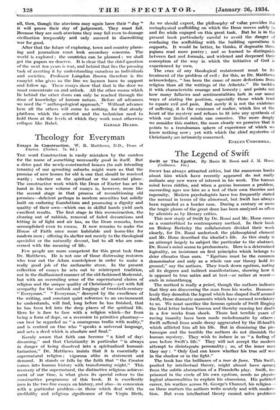Theology for Everyman Essays in Construction. W. R. Matthews, D.D.,
Dean of Exeter. (Nisbet. 7s. 6d.) THE word Construction is easily mistaken by the careless for the name of .something necessarily good in itself. But a drive past the newly-constructed houses (to suit intending tenants) of our sprouting suburbs might warn us that the promise of new homes for old is one that should be received warily ; whether on the spiritual or the material plane, The constructive work which the Dean of Exeter has set in hand in his new volume of essays is, however, more like the second stage in that process of reconditioning old premises—deficient perhaps in modem amenities but solidly built on enduring foundations and possessing a dignity and quality of their own—which can in skilful hands yield such excellent results. The first stage in this reconstruction, the clearing out of rubbish, removal of faded decorations and letting in of light and air has, as the Dean remarks, been accomplished even to excess. It now remains to make the House of Faith once more habitable and home-like for modern men ; offering its shelter not merely to the theological specialist or the naturally devout, but to all who are con- cerned with the meaning of life.
Few people are more competent for this great task than Dr. Matthews. He is not one of those distressing restorers who tear out the Adam mantelpiece in order' to make a really good job of the anthracite stove. In the present collection of essays he sets out to reinterpret tradition, not in the disillusioned manner of the old-fashioned Modernist, but with an overruling sense of the supernatural claims of religion and the unique quality of Christianity—yet with full sympathy for the outlook and longings of twentieth:century . " Everyman." " Everyman," decoyed by the excellence of the writing, and constant quiet reference to an environment he understands, will find, long before he has finished, that he has been led into the deep places of the spiritual life. Here he is face to face with a religion •which—far from being a form of dope, or a reversion to primitive phantasy-6 can best be regarded as " a courageous traffic with reality," and is centred on One who " speaks a universal language, and acts a deed which is absolute and final."
Keenly aware that faith can become " a kind of day= dreaming," and that Christianity in particular " is always in danger of being dissolved into a spiritualized humani= tarianism," Dr. Matthews insists that it is essentially a Supernatural religion ; vigorous alike in statement mid demand. It stands or falls by the faith that " the Creator Conies into human history with transforming might." This recovery of the supernatural, the distinctive religious achieve= went of our time, is what gives its special colour to the Constructive programme of this book. It is excellently been in the two fine essays on history, and also—in connexion with a particular problem—in those which deal with the credibility and religious significance of the Virgin- Birth; As we shoulel expect, the philosophy. of value provides the metaphysical scaffolding on which the Dean moves safely to and fro while engaged on this great task. But he is in the present book particularly careful to avoid the danger of confusing the scaffolding with the building operations it supports. It would be better, he thinks, if dogmatic theo- logians read more poetry ; and so learned to distinguish between fact and formula, and widened and deepened their conception of the way in which the initiative of God is experienced by men.
The crux of any theological restatement must be its treatment of the problem of evil : for this, as Dr. Matthews acknowledges, " has been the cause of more defections from religion than all the writings of the Atheists." He tackles it with characteristic courage and honesty ; and points out how many fallacies and sentimentalities lurk in our usual ways of stating the position, especially those which tend to equate evil and pain. But surely it is not the existence of suffering, it is the existence of malice, which lies at the heart of the mystery and refuses to fit into any synthesis of which our limited minds can conceive. The more deeply we consider this matter, the more clearly we perceive that it points to a transhuman sphere of experience of which we know nothing now ; yet with which the chief mysteries of Christianity are intimately concerned.
EVELYN UNDERHILL.










































 Previous page
Previous page